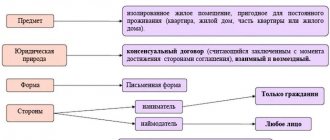1. A residential lease agreement is concluded for a period not exceeding five years. If the contract does not specify a term, the contract is considered to be concluded for five years.
2. The rules provided for in paragraph 2 of Article 677, Articles 680, 684 - 686, paragraph four of paragraph 2 of Article 687 of this Code are not applied to a rental agreement for residential premises concluded for a period of up to one year (short-term rental), unless otherwise provided by the agreement .
- Article 682. Payment for residential premises
- Article 684. Preemptive right of the tenant to conclude an agreement for a new term
Who most often rents short-term housing?
Most often, residential premises are rented for a short period of time by people who come on a business trip from another city . The organization where they work can conclude a contract for them. You can learn more about renting an apartment on a business trip from this material.
Families with children who come from another city on an excursion also often rent an apartment for a short period of time, and for them the question of how to rent it correctly, that is, without being deceived, is very important.
Citizens who come to work, for example, in the capital, most often rent housing under such conditions, and knowledge of the rules for renting an apartment on a daily basis is an urgent need for them.
Powers and Responsibilities
By signing the agreement, both parties assign to themselves certain powers and responsibilities. In general, a tenant has slightly fewer rights under a short-term rental agreement than under agreements signed for long periods.
It is worth separately identifying which of the counterparties should pay for housing and communal services and other services. Most often, responsibility for this falls on the employer. Payment can be made according to two schemes:
- Rental of premises and housing and communal services are paid separately. In this case, the tenant himself must pay utility bills in any convenient way.
- The owner is paid the entire amount at once - both for rent and for utilities. In this case, he pays for housing and communal services himself.
At the landlord's
The owner undertakes:
- Provide for use exactly the real estate and other property for which the contract was concluded.
- Do not transfer the apartment for use to other persons not specified in the agreement.
Plus, the tenant can, if necessary, demand the owner to carry out major repairs to the housing (Article 681 of the Civil Code).
A separate requirement is payment of income tax. Since the premises are rented on commercial terms, the landlord will have to provide his income on his tax return. He is obliged to attach to it a copy of the agreement, which indicates the exact amount received as a result of the transaction. She is charged 13%, taking into account the expenses incurred by him for the maintenance of the property.
At the employer's
First of all, the employer undertakes:
- Pay the payments stipulated in the contract on time.
- Return the premises in proper condition.
- Use housing and other property in the order specified in the agreement, maintaining it in proper condition.
- Allow the owner into the premises on designated days (to inspect the living space).
But the employer can agree with the landlord to transfer funds against receipt. It will be evidence that he is fulfilling his financial obligations. In addition, repairs during the rental period also fall on the shoulders of the tenant (Article 681 of the Civil Code).
If he agreed to pay for housing, utilities and other services on his own, then he should keep all payment receipts. They can be useful both in controversial situations and if the parties want, after the expiration of the old one, to conclude a new lease agreement.
The nuance is that if the owner of the apartment discovers that the terms of the agreement have been violated, he will be able to evict the tenants in court as soon as possible. The owner is not obliged to provide the tenant with time to move.
At what age can you rent an apartment daily?
REFERENCE! According to Article 26 of the Civil Code of the Russian Federation, children aged 14 to 18 years can enter into transactions only with the written permission of their legal representatives (parents, adoptive parents, guardians).
According to the legislation of the Russian Federation, written consent does not require certification by a notary office. At the same time, the personal presence of legal representatives at the transaction is also not mandatory. Parents can draw up a document by handwriting it in any form. Thus, you can only rent an apartment independently and without written consent if you are 18 years old.
However, the exception is marriage entered into by children before they reach adulthood. In such a situation, the citizen is fully capable and has every right to enter into any agreements independently (Article 21 of the Civil Code of the Russian Federation).
Algorithm of actions
What should you pay attention to first?
When choosing housing, you need to not only rely on positive stories and a smiling landlord, but also pay attention to other points. A very important point is checking documents. It is very dangerous to fall into the hands of scammers who, under the guise of owners, may offer other people's apartments.
So, important points:
- It is important to check the owner by asking leading questions during the inspection. For example, you can ask about infrastructure. If the owner begins to avoid answering, then this gives reason to think. You also need to ask the landlord for passport details and documents for the apartment. Typically, such a document is a registration certificate.
- You should definitely pay attention to the reason why the former tenants moved out. If they found a more suitable option, then that's good. The main thing is that the owner does not end up being a brawler.
- It is very important that there are no debts on utility bills. Otherwise, the power may be cut off.
- Look at the view from the window and the surrounding area. If there is a nightclub or other similar establishments opposite, then it is unlikely that it will be peaceful to live in such an apartment, and especially to sleep at night.
- If possible, you need to look at the people who live in neighboring apartments. If the people are suspicious (alcoholics, drug addicts and the like), then you should refuse such an apartment.
- If there is an automatic air freshener hanging at the entrance to the room, this may indicate an unpleasant odor. Turn off the air freshener and smell the natural scent. Owners often mask unpleasant odors from sewerage, dampness, and other things.
- If the windows of the apartment have old double-glazed windows and there are cracks, then most likely it will be very cold in such a room when frost sets in.
- Open the water tap and see what the pressure is. High floors usually have water problems.
- If the apartment is corner, then it is important to look at the joints. They must be dry. In rain or sleet, such joints can become damp and moldy.
- If there are traces of chalk behind the pipes, on the floor or baseboard, then there is a possibility that unpleasant insects live in the apartment.
- You should not agree to a deal if the landlord does not want to enter into an agreement.
- It's worth paying attention to the price. For the average level of payment (for a particular region), the apartment should be suitable for living. The living space must be equipped with proper sewerage, electricity, heating, hot and cold water.
You can find out more about how to rent an apartment without getting scammed here.
What questions should you ask the owner?
- Questions regarding payment.
- Payment period.
- Questions regarding the renovation of the premises.
- Hiring terms.
- Questions regarding the number of owners of the property being rented out.
- Availability of furniture, household appliances and other property.
- Conditions in the apartment.
What documents need to be completed?
REFERENCE! A well-drafted rental agreement guarantees a safe rental of housing. The agreement is between the landlord and the tenant. The document has legal force and protects the rights of both parties in court.
It is better not to enter into an agreement if there are doubts about the legality of the transaction on the part of the lessor.
Agreement requirements
The contract must contain the following information:
- Lessor's personal information and contact details (telephone numbers).
- Personal information of the tenant and his contact information.
- Information from identification documents of both parties.
- Period for renting out the apartment (exact dates are indicated).
- The amount of payment for the month of residence and the date of its collection.
- Payment transfer procedure.
- A separate paragraph indicates information about who will pay utility bills and when.
- Information about fines and penalties that may be levied on parties to a transaction if a violation of the terms of the concluded agreement is detected.
- The owner must indicate in the agreement that the living space is transferred exclusively for living. Use for commercial purposes is strictly prohibited.
- Procedure for terminating the agreement.
- The procedure for resolving disputes.
- Rights and obligations of the parties to the transaction.
- The date of the transaction.
- Signatures of both parties and transcript.
Watch a video about what information a short-term rental agreement should contain:
Design rules
- According to Article 673 of the Civil Code of the Russian Federation, a rental agreement is concluded in writing between the owner (owner of the property) and an individual (tenant).
- There is no need to register the agreement at a notary office.
- Mandatory items are: personal data of the parties, characteristics of the property being rented, including area, amount of payment, as well as the rights and obligations of the parties.
- For the safety of the transferred property (furniture, household appliances, etc.), it is necessary to draw up a transfer deed with a detailed description of each item.
Watch a video about how to correctly draw up a short-term rental agreement for residential premises:
What to consider when making a conclusion?
Unlike long-term contracts, which can be extended for up to five years, a short-term contract expires. In this case, the date of termination of the relationship is the number indicated in the agreement .
Early termination of the agreement is also allowed:
- By agreement of the parties.
- If the residential premises in fact do not correspond to the description in the agreement.
- In case of violations of the use of housing.
- If the tenant does not pay for accommodation for more than two months.
- In case of any violation of the terms of the contract.
- In case of damage, theft of property and other dishonest actions of the tenant.
IMPORTANT! Points under which early termination may be permitted are also stipulated and must be spelled out in the contract.
Main points of the contract
The document regulating the procedure for renting out housing has certain requirements. Since the hiring rules in the contract are the result of an agreement, it is possible to include other parameters that are important for a particular transaction in the standard template. The essential terms of the contract include provisions specified by law as mandatory, as well as points that are important to establish by agreement of the parties.
Download the Residential Tenancy Agreement. Sample (47.0 KiB, 18,548 hits)
Apartment rental agreement. Form (74.5 KiB, 14,623 hits)
Standard form for a short-term rental agreement for residential premises (74.9 KiB, 6,455 hits)
The subject of the agreement determines the data that makes it possible to identify the real estate planned for transfer to the tenant.
According to paragraph 1 of Art. 673 of civil legislation, the subject of the contract can be: a room, a house, an apartment, an isolated premises that meets the characteristics of a residential property in accordance with the Housing Code of the Russian Federation.
In the absence of information about a specific property, it is impossible to establish the subject of the agreement that has arisen, which allows the document to be considered invalid.
Additional conditions imply their deliberate acceptance by the parties as an integral part of the contract, automatically established by legislative acts. No additional conditions are required.
These items include the following provisions:
- Obligations to pay for the occupied living space on the terms established by the parties. Unless otherwise defined in the text, the tenant is required to pay utility bills.
- The validity period of the document determines the period during which the agreements of the parties will be valid. Since the maximum term of such an agreement is limited to 5 years, in the absence of other instructions, the housing is transferred to the tenant for a 5-year period. The daily rental agreement specifies the specific date and hour of the beginning and end of the operation of the housing.
- Determination of persons who are allowed to live in the rented premises, except for the tenant himself. If there is no indication of permission for other citizens to live in a given living space, move-in is carried out in accordance with the procedure established by law.
- The tenant undertakes to maintain the housing in proper condition and carry out routine repairs, however, other conditions may be specified in the clauses of the agreement.
- The owner is obliged to carry out major repairs at his own expense, but the law does not prohibit the inclusion of other agreements in the contract.
- The amount of payment for rented housing is the subject of an agreement and is determined by mutual agreement of the parties within the limits permitted by law.
- It is permissible to transfer the rented premises to a subtenant if the owner agrees with the terms of the transaction. At the same time, it is established that the subtenant has no rights to independently use housing. According to the signed document, the employer remains responsible for fulfilling the terms of employment.
To eliminate misunderstandings and subsequent claims regarding the condition of the transferred object when renting for a day or more, signing an acceptance certificate, which records all the essential characteristics of the object.
The tenant is obliged to return the property to the owner in the same condition, including items that were transferred along with the living space. Damage to property by the tenant gives the right to demand compensation.
Features of the agreement
- A short-term contract is concluded for a period of no more than 11 months (Article 683 of the Civil Code of the Russian Federation).
- The employer does not have the right to further continue the contractual relationship after the end of the contract. This means that the landlord is not obliged to offer the tenant to renew the agreement (Article 683 of the Civil Code of the Russian Federation).
- There is no provision for moving any temporary residents into the apartment, even for a limited period.
- If a tenant dies or if he wants to move out of the apartment, relatives or cohabitants cannot replace him and live in this residential premises. All persons are required to leave the apartment with the tenant.
- If violations of the terms of the contract, damage to property or non-payment are detected, the owner does not need to give the tenant time to eliminate them. When going to court, the owner of the property can easily evict the tenants in a short time.
Short-term rental agreements are not subject to registration (Article 674 of the Civil Code of the Russian Federation).
Our experts have prepared other interesting and useful materials on the topic of hiring real estate:
- What is a rental agreement for specialized residential premises and how to draw it up?
- Nuances and sample of filling out a commercial rental agreement for residential premises.
- Legal nuances of apartment rental payments: sample schedule, necessary documents and general rules.
- Legal subtleties of processing fees under a rental agreement.
- What documents must the landlord have and what are his rights?
- What is social hiring?
The procedure for drawing up the contract form
How safe and convenient further cooperation will be depends on the drafting of the document. A legally sound contract is designed to protect the parties from unfounded accusations or infringement of rights.
The mandatory details of a standard document include the following items:
- Accurate information about the parties to the transaction: their names, registration, information from the passport.
- Information about persons who will share housing with the tenant.
- Description of the transferred object, its main parameters (area, location, floor, number of rooms rented).
- Information about the condition of the property at the conclusion of the contract.
- Signing date and rental period. For short-term hiring, the validity period is limited to an incomplete calendar year (up to 364 days). Most agreements are signed for 11 months.
- Payment amount and transfer options.
- Indication of those responsible for paying utility costs.
- Rights and obligations (any information establishing the procedure for using housing, its maintenance, etc.)
- Grounds for termination.
- Fines and compensation procedures for property damaged during operation.
- Signatures of the owner and tenant.
The procedure for transferring housing requires the preliminary presentation of real estate documents proving the owner’s right to rent out housing. The premises must be recognized as suitable for habitation, comply with sanitary and epidemiological standards, and the technical plan of the facility.
The use of the premises by the tenant implies a ban on the presence of third parties, eliminating the risk of strangers moving in. If the main tenant moves out, the remaining tenants who moved in with him are required to leave the property. If you intend to sell an apartment, house, or room, the owner notifies the tenant of the upcoming transaction 30 days in advance.
Determination of the rights and obligations of the parties to hire
Particular attention is paid to the paragraph with the obligations and rights of the parties. This section includes identifying the main issues related to the operation of housing by the tenant:
- Conditions for transferring living space for temporary use.
- Issues of carrying out repair work in order to maintain the technically sound condition of the facility.
- The procedure for notice of eviction and its implementation.
- Conditions for early termination of the contract at the initiative of one of the parties.
- Compensation for property damage caused by residents.
- Rules for making payments for housing and communal services and hiring (payment options, terms).
Of the general provisions that are present in the contract, the following rules should be noted:
- In the event of the death of the owner, the contract continues to be valid for the period established in it, without the right of the heir to change the conditions.
- The payment amount is not subject to change during the validity period.
- In the event of a delay in payment, compensation may be collected from the lessor - 1% of the amount of the debt.
- Subletting of housing by the tenant is not allowed; the premises are transferred exclusively for his personal use.
- The tenant is obligated to pay on time and comply with accommodation standards.
- The lessor bears financial responsibility for the damage caused and is obliged to eliminate the consequences of damage to property. If it is established that the tenant is at fault for causing damage, repairs are made at his expense.
- Termination of the contract at the initiative of the tenant is carried out 3 months after notification to the owner.
The importance of the provisions of the signed agreement should not be ignored, since in the future all relationships between the parties will be regulated by the content of this legally significant document.
Is it possible to get by with a verbal agreement?
ATTENTION! Renting an apartment without concluding an appropriate contract is possible, but not advisable. This is due to the fact that both parties will not know their rights and obligations, and therefore will not be able to resolve disputes in court.
The agreement, as well as the deed of transfer (an inventory of the property and contents of the apartment) allows both parties to avoid any disagreements in the future and protect their rights in court. After all, according to the rental agreement, the tenant undertakes to return the apartment at the end of the agreement in the form in which he moved into it.
To summarize, it can be noted that a short-term rental agreement is most beneficial to the owner of a residential premises. Such a contract significantly limits the rights of the tenant and facilitates the procedure for his eviction.
If you find an error, please select a piece of text and press Ctrl+Enter.
Legislation on the rental of residential premises
The document regulates the relationship between the landlord and the tenant, recording all the essential details of the transaction - from the description of the residential premises to the rental price and payment terms.
Article 673 of civil legislation defines the object of the contract as an isolated premises that meets living conditions, and can be presented in the form of a house, apartment, or part thereof.
Standards of habitability are determined by the provisions of housing legislation, and according to Article 290, the tenant has the right to use the property of the house, subject to living in an apartment building.
From a legal point of view, it is important to distinguish between a social rental agreement and a commercial rental agreement , including daily rental:
- Under social rent , it is possible to provide housing from a special social fund if it is determined that a citizen permanently residing in a certain locality needs improved conditions and is registered accordingly. The authorized state body must make a decision to provide the specified housing on the basis of a warrant. In fact, a social tenancy agreement is not, in the full sense, a document establishing an agreement between the landlord and the tenant, because all clauses of the agreement, obligations, rights, procedures for use and termination are determined without the participation of the citizens themselves, on the basis of federal and regional regulations.
- Commercial short-term hiring is formalized by an agreement, which is a full-fledged civil law document, by which the parties independently determine the terms of cooperation and the main parameters of the transaction. The main points that must be established by the contract are: period of validity, conditions of transfer for use, payment, obligations, etc.
The object transferred from the owner to the tenant can be: an apartment, a room, a house. The identification features and characteristics of the object must be clearly described in the clauses of the agreement.
Read about the room rental agreement here.
Distinctive characteristics of short-term hiring
A short-term rental agreement has a number of characteristic features that distinguish it from other types of legally significant documents in relation to real estate:
- There is no need to officially register the fact of transfer of housing for use to other persons.
- No notarization is required, which means there are no additional registration costs.
- The duration of the agreement has limitations and is established taking into account the will of the owner and his right not to renew the document.
- Persons for whose use the housing has been transferred are prohibited from assigning the right of residence to a third party.
- Violation of the provisions regarding the tenant's obligations serves as a legal basis for early termination of the agreement without providing additional time to find a new place of residence and organize the move.
Thus, a short-term rental agreement confirms on paper the oral agreements that have arisen and regulates further relationships between the owner of the property and the person to whom the housing was transferred on a paid basis.








